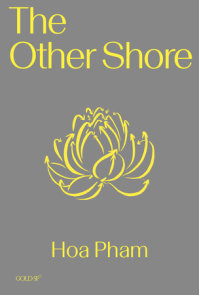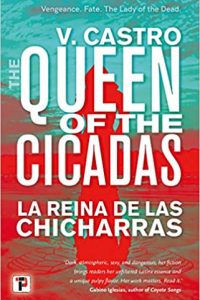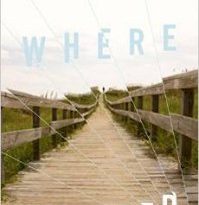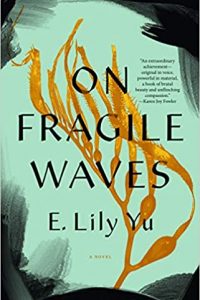Ian Mond Reviews Empathy by Hoa Pham
 Empathy, Hoa Pham (Goldsmiths Press 978-1-91338-061-8, $24.95, 256pp, tp) November 2022.
Empathy, Hoa Pham (Goldsmiths Press 978-1-91338-061-8, $24.95, 256pp, tp) November 2022.
The 2018 documentary Three Identical Strangers tells the astonishing and distressing true story of triplet brothers split at birth who become aware of each other only by chance when they turn 19. The documentary reveals that the triplets were part of a “nature versus nurture” study that was never disclosed to the boys or their adoptive parents. It’s a film that often came to mind as I read Hoa Pham’s short new novel Empathy. Central to the narrative is a quintet of illegally cloned Vietnamese girls separated when they were five and reunited only after two decades. Like the triplets, the quintet are unwitting members of an experiment. But while the unethical research outlined in Three Identical Strangers was never formally published, the sisters discover that their unique biology has aided CHESS, a multinational pharmaceutical company, to develop an intoxicating new party drug known as Empathy.
Living in Hanoi, isolated from her other “multiples,” Vuong has been taught (forced) by the Vietnamese government (AKA the Department) to view herself as an individual rather than a collective. That sense of self is tested when she comes face to face with one of her sisters for the first time in two decades. The Department has sent Lien to a rehabilitation centre for murdering her foster father because he slaughtered the pigs she had come to identify with.
“The pigs were we,” [Lien] said simply. I stared at her, aghast. Had she bonded with all the pigs? “There were many of them. All the same. They were like we. And he killed them!”
This encounter acts as a catalyst, with Vuong allowed to travel to Australia, where her multiple Geraldine is dying from cancer and New Zealand, where her two sisters, Giang and Khanh, live as twins and communicate telepathically. As a collective, they realise how the Department has abused them physically and psychologically over the decades.
Running parallel to Vuong’s journey of discovery is My’s experience with Empathy. The University student, who lives with her Vietnamese mother in West Berlin, is given the party drug by Truong, the cute but clearly shady guy she meets at her part-time job serving pho. Empathy, as My discovers, amps up sex – “I felt my desire and his entwined, I was fucking and being fucked all at the same time” – but also sends her into a paranoid tailspin, convinced that her mother, a cleaner for CHESS, is an ex-Stasi agent spying on the pharmaceutical giant. When Truong asks My to “courier” a sample of enhanced Empathy stolen from the CHESS laboratories to Vietnam, My realises that her Empathy-influenced delusions are nothing compared to what the Vietnamese Government has planned for the drug.
Empathy is at its best when Pham explores Vuong’s inner turmoil, the loneliness and mental anguish caused by being separated from her multiples. “We have always been we,” Vuong informs us in the novel’s opening sentences. “Then they forced us to become you and I.” This conflict between “I” and “We” carries through the novel, whether it be Vuong’s initial disgust at Lien identifying with pigs or her growing sense of awareness in the face of Geraldine’s anger toward the Department and their creator (who we only know as “Ma”) or the sheer joy she experiences when first communicating telepathically with her New Zealand sisters. While the plot mainly revolves around My and her dealings with Truong, it’s Vuong’s transition back to “We” that pulls the novel’s threads together.
Weaponised empathy is a fascinating, thought-provoking idea that resonates because we live at a time when that emotion is in short supply. Pham recognises this: her portrayal of Berlin, with Neo-Nazis violently protesting against migrants like My and her mother, echoes the surge in right-wing extremism across Europe since 2016. But as much as I adored the irony of late-stage capitalism (as represented by CHESS and the “Department”) finding an application for kindness, I was left wanting on the moral question. Characters do ponder whether it’s right to force “the whole human race [to] feel for each other, whether they liked it not” however, for the most part, the question remains unexamined, with Pham more interested (justifiably) in the intimate connections between her characters than the broader social and ethical issues posed by the drug.
That reservation aside, it’s refreshing (and sadly still a novelty for mainstream novels published in the West) to read a science fiction novel that prioritises a non-Western perspective. Just as Lagoon by Nnedi Okorafor subverts the alien invasion narrative by putting Nigeria, rather than Europe or America, at the heart of the action, Pham does something similar with shadowy, “deep-state” conspiracies by having the Vietnamese Government pull the strings. I also loved how “Hui” circles – a lending club typically established by Asian migrant communities – play a vital role in the plot, and I drooled at the several types of pho sampled throughout the story. Empathy may not entirely tick all of my boxes, but it’s hard to dislike a novel that’s so passionately about the emotional and cultural bond between families, cloned or otherwise.
Ian Mond loves to talk about books. For eight years he co-hosted a book podcast, The Writer and the Critic, with Kirstyn McDermott. Recently he has revived his blog, The Hysterical Hamster, and is again posting mostly vulgar reviews on an eclectic range of literary and genre novels. You can also follow Ian on Twitter (@Mondyboy) or contact him at mondyboy74@gmail.com.
This review and more like it in the February 2023 issue of Locus.
 While you are here, please take a moment to support Locus with a one-time or recurring donation. We rely on reader donations to keep the magazine and site going, and would like to keep the site paywall free, but WE NEED YOUR FINANCIAL SUPPORT to continue quality coverage of the science fiction and fantasy field.
While you are here, please take a moment to support Locus with a one-time or recurring donation. We rely on reader donations to keep the magazine and site going, and would like to keep the site paywall free, but WE NEED YOUR FINANCIAL SUPPORT to continue quality coverage of the science fiction and fantasy field.
©Locus Magazine. Copyrighted material may not be republished without permission of LSFF.







